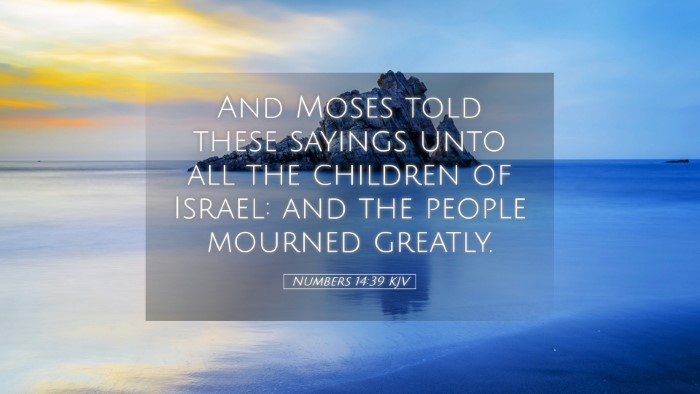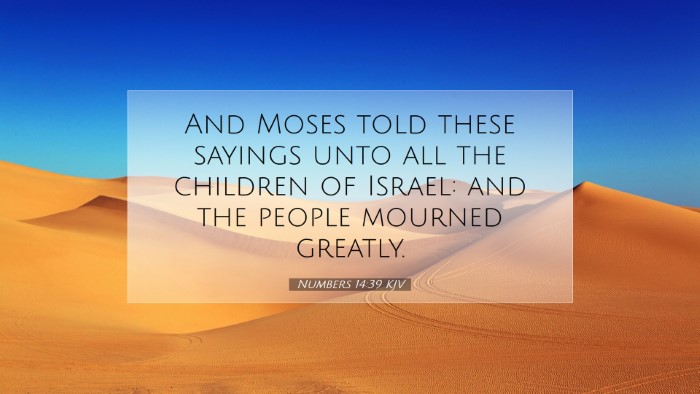Commentary on Numbers 14:39
The verse in question, Numbers 14:39, states:
"And Moses told these sayings unto all the children of Israel: and the people mourned greatly."
Contextual Overview
This passage occurs in a critical narrative within the Book of Numbers, following the Israelites' refusal to enter the Promised Land due to fear and a lack of faith. The chapter depicts the consequences of their rebellion and God's judgment on the generation that doubted His promises.
Insights from Public Domain Commentaries
Matthew Henry's Commentary
Henry emphasizes Moses’ role as mediator between God and the Israelites. He notes that Moses delivered not only the judgments of God but also the promise of future deliverance. When the people mourned, it was a reflection of their sorrow over their disobedience and the realization of the gravity of their sin.
- Repentance and Regret: The mourning indicates the people’s recognition of their wrong choices, highlighting a vital aspect of spiritual growth - the acknowledgment of sin.
- Consequences of Disobedience: Henry argues that their mourning is a direct response to understand that their previous lack of faith resulted in a lost opportunity.
Albert Barnes' Notes on the Bible
Barnes elaborates on the emotional response of the people. He argues that this mourning signifies a moment of clarity following their previous obstinacy. They grasped the impact of their disbelief.
- Fear of Judgment: The Israelites feared not only their mortal fate but also the spiritual implications of their actions. This evokes questions on the nature of repentance.
- Implications for Future Generations: Barnes points out that this moment serves as a teachable instance for succeeding generations about the importance of faith and obedience to God.
Adam Clarke's Commentary
Clarke places emphasis on the power of accountability and how the people faced the dire consequences of their disbelief. He notes that the weight of their actions bore heavily upon them.
- The Nature of Divine Justice: Clarke articulates that God's justice is not arbitrary; rather, it is a response to the choices of His people. The mourning shows a potential turning point.
- Transformation Potential: While mourning may reflect sorrow, Clarke points out that it could also lead to transformation and renewed faith in God's promises.
Theological Implications
This verse and its surrounding context provide rich ground for theological reflection. It calls into question the nature of faith, obedience, and the human response to divine judgment.
- The Role of Faith: The Israelites' failure and subsequent mourning serve to highlight the necessity of faith in the life of a believer.
- Process of Repentance: The sorrow of the Israelites can be understood as the first step towards true repentance, which necessitates a heartfelt acknowledgment of wrongdoing.
- Hope Amidst Judgment: Despite the somber tone, the passage holds a promise for future generations to learn from past failures, thereby emphasizing God's enduring faithfulness.
Conclusion
In Numbers 14:39, we find a poignant reminder of the consequences of disbelief and the hope offered through repentance. The insights from diverse biblical scholars illuminate the path for present-day pastors, students, and theologians to understand the depths of God's justice and mercy.


